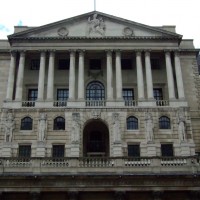
However, markets see a 50% chance of a rate hike by August and a 70% chance by November, according to a report by Capital Economics.
At the last MPC meeting, seven of the nine members voted to keep rates on hold.
And economic data since has been far from convincing.
Economic data overview
May’s Markit/CIPS surveys suggest the economy is expanding at a quarterly pace of around 0.4%, in line with the BoE’s latest inflation report forecast.
However, the weakness in industrial production and construction sectors at the start of the second quarter, is unlikely to alleviate the MPC’s concerns about a weakening in the underlying pace of growth, according to Pantheon Macroeconomics.
It’s thought April’s labour market figures also will worry the MPC.
Although the employment rate among adults aged 16 and over edged up to a new record high of 61.1%, the fall in average hours, to its lowest level since November 2012, indicates that hidden slack has increased.
In addition, average weekly wages fell by 0.1% month-to-month, despite a 4.4% jump in the National Living Wage in April. This brought down the year-over-year rate to 2.5%, from 3.0% in March.
At the same time, inflation held steady at 2.4% in May, matching the MPC’s inflation report projection.
In positive news, retail sales volumes recovered in April and May, and are on course for a hefty quarter-on quarter gain of about 1.8% in second quarter.
Uncertainty on Brexit
Meanwhile, the MPC’s view that rates need to rise this year assumes that a transition deal with the EU is in place by March.
But the threat of a leadership contest or general election, which could lead to a sudden change in economic policies, continues to loom large.
Ruth Gregory, analyst at Capital Economics, said: “Looking further ahead, the August meeting will be Ian McCafferty’s last, after which an unknown enters the equation with the arrival of new Committee member, Jonathan Haskel. Most obviously, this will weaken the hawk camp.
“However, if we are right in thinking that a fall in inflation and subsequent recovery in real wages will help growth to outperform the MPC’s expectations, and as long as further progress continues to be made on the Brexit negotiations, then our sense is still that rates will probably rise two times before the year is out.
“For now, though, we expect the MPC to keep policy unchanged.”
Laith Khalaf, senior analyst at Hargreaves Lansdown, said: “Markets think there will probably be a rate rise by the end of the year, though expectations have been reined back significantly, and there is now a good chance rates will stay on hold.
“Inflation may stay above the Bank of England’s target thanks to increasing energy bills and higher prices at the petrol pump, but the Bank has shown it’s willing to look through elevated inflation in the interests of the wider economy.
“The Bank would like to have rates at a higher level in order to battle the next economic downturn, but it’s currently more wary of being the trigger for such a slowdown by hiking rates prematurely.
“Irrespective of the precise timing of the next interest rate hike, the longer term picture remains one of subdued and gradual rate rises, in the absence of a destabilising economic shock of course.”















